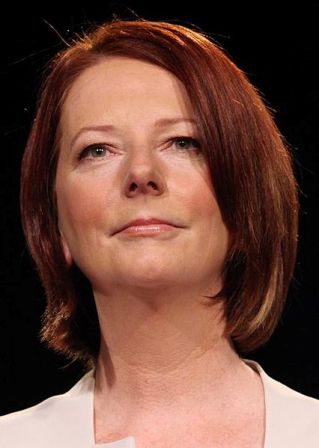the gillard hypothetical: what if the gender jibes were racial ones?

Before the leadership spill that removed her, then Prime Minister Julia Gillard gave a lengthy interview to Chloe Hooper for The Monthly magazine. She talked about the combative turn politics has taken, about Barack Obama, about her famous misogyny speech. She also talked about the sexism she was subjected to as a result of being a woman who occupied the “top job”. By now, everyone knows what Gillard is speaking about when she mentions this sexism. Everyone can recall Alan Jones, ‘Ditch the Witch’, Howard Sattler, the tweets and the jeers. Any objective observer will acknowledge the deeply sinister and calculated way in which she was undermined at every turn. Julia Gillard was forced to defend her life, rather than her policy. Instead of talking about issues pertaining to the office of Prime Minister, she was forced into a dialogue about her sex life and domestic choices.
But what if, instead of gender, it was about race? That was the scenario posed by the former Prime Minister during the interview. What if, she asks, instead of being the country’s first female prime minister, she was the first Indigenous one?
‘I think the stuff about me, because it’s gender, gets glossed over more easily’, says Gillard. ‘If I was the first Indigenous prime minister, and [Tony] Abbott had gone out and stood next to a sign that said, “ditch the black bastard”, I reckon that would be the end of a political career.’
Racism isn’t always easy to spot. It can be subtle, it can be quiet and it can go unnoticed (or be too large to be appreciated). But when it is noticed, it’s called out. It’s spoken about. Racism is one of the remaining vestiges of a time when discrimination and hate prevailed among lawmakers and laymen alike, and people are right to call it out when they see, or experience it. Julia Gillard was a victim of another form of discrimination, one as equally steeped in the past. She, too, was vilified and hated because of a quality about her that was deemed inferior to a dominant group.
But the difference here is how those different forms of discrimination are spoken about. A fall-back for many men – and a disheartening number of women – is to scoff and sneer when the subject of the sexism that pervaded Gillard’s term comes up. They roll their eyes, mutter something about feminazis and say she got what she deserved. Their dislike of her policies, of her party’s decisions, of strong women in positions of authority, of change, of atheism, of childlessness and of redheads all result in the dismissal of the possibility that Julia Gillard suffered any injustice; that a woman was unfairly treated because of her sex.
Flip the situation around and run with Gillard’s hypothetical. If in 2010 we had seen an Indigenous politician become Prime Minister, would the situation have been different? If this prime minister had been the victim of a smear campaign based precisely around the thing that made her (or him) different from any other prime minister, would this have been ignored by mainstream media and by fellow lawmakers? My guess is no. Racism is so hateful, so poisonous and so unjust that any detectable hint of it, particularly in a professional setting, will encourage fierce debate and action. There is a political price to be paid for those who tacitly support it.
If we had seen images of Tony Abbott standing next to signs that read ‘ditch the black bastard’, there’d have been uproar. If an Indigenous prime minister’s ability to do the job was called into question because of race, there’d have been uproar. While it’s a nice thought that we live in a country where blatant racism against a prime minister wouldn’t be accepted, why do we live in a country where blatant sexism is brushed off (or disingenuously accepted as “part of the job”)? Every way she turned, Julia Gillard was faced with this prejudice. The fact of her position allowed it to be buried under politics, but that fundamental sexism remains.
When we see, hear or read about racism, everyone (bar the actual holders of these views) cares — or at least acknowledges it. Everyone should care, but everyone should also care about sexism. However, the duty of defending our first female prime minister was left to women (and in particular, women who identify as feminists). It should have been left to everyone. Because everyone, regardless of race or gender, is a person. And a prime minister is a prime minister. We need a society that doesn’t accept any kind of discrimination. If there’s a silver lining to be taken from how Julia Gillard was treated, it’s this very debate: I hope we are one step, or several, closer to that kind of society.

